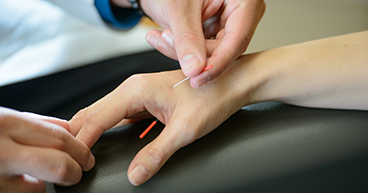
The impact of cancer and cancer treatments on the body’s immune system may lead to many changes in patients’ daily lives, especially as they navigate through the COVID-19 pandemic. A weakened immune system, for example, may require you stay inside more, avoid crowds, be vigilant about washing hands and cleaning surfaces.
Some immune-related impacts directly affect patients’ oral health. Consider, for example:
- Compromised immunities may cause mouth sores or other issues that impede normally simple everyday tasks, such as eating, swallowing or talking.
- Cancer treatments may damage the cells lining the mouth, potentially allowing bacteria, fungi and viruses to more easily infect oral cavities.
- Mouth sores and/or dry mouth can be painful and make it difficult to eat and talk.
- When oral mucositis becomes severe, it can also cause bleeding or infection.
Oral problems are common in people with cancer, particularly in patients with head and neck cancers. Your doctor or dentist may prescribe medications to help heal and soothe your mouth. Sometimes oral complications can become severe enough that it is necessary to modify or delay your treatment so your mouth can heal. Good oral hygiene can also help decrease the severity of mouth sores and other problems.
What is mucositis?
Oral mucositis or stomatitus is an inflammation of mucous membranes inside the mouth. Symptoms of mucositis/stomatitus may include: mouth sores, white patches on the tongue, redness or irritation of the mouth and throat, pain when swallowing or the sensation of a lump in the throat, dryness of the mouth, tenderness or burning when eating spicy or acidic foods.
What is xerostomia?
Dry mouth, or xerostomia, (which can also lead to oral mucositis) occurs when the salivary glands do not produce enough saliva. Saliva also helps to neutralize acid in the mouth and clean the teeth and gums, thereby helping to prevent infection, mouth sores, tooth decay, and gum disease. Symptoms of xerostomia may include thick or stringy saliva, taste changes, cracked lips, sore tongue and/or changes in your ability to speak clearly.
Tips for managing mouth sores and dry mouth
To help manage cancer-related mouth issues, check your mouth each day to look for any changes. Check the inside of your cheeks, the roof of your mouth, your lips, gums and under your tongue. Look for red areas or white patches, which often become sores. Visit your dentist, who can check the health of your mouth and teeth and help lessen the severity of oral complications like infection. Other tips include:
- Drink plenty of fluids (eight to 10 glasses of water) each day to moisten the mouth and avoid dehydration. A straw may make drinking easier.
- Try chewing sugarless gum or sucking on sugarless candies to help increase saliva flow.
- Avoid drinking fluids that are very hot or cold, as well as acidic drinks, such as orange or grapefruit juices, which can irritate mouth sores.
- Eat soft, bland and lukewarm/cool foods, including puddings, soups, frozen desserts, mashed potatoes, noodles or pasta, that are easy to swallow. Moisten dry foods with gravy, broth or milk, or puree food in a blender to make it softer and easier to eat.
- Do not eat spicy or fried foods. Avoid acidic or high-sugar fruits and juices, which can make you more susceptible to tooth decay. Avoid alcohol and tobacco.
- Try milk or dairy-free milk products (soy, almond or rice milks), which may help thicken mucus secretions.
- Ask your doctor if there is a solution you can rinse with to numb your mouth sores, or a pain medication you can take before meals.
- Gently brush your teeth, gums and tongue with a soft bristled toothbrush in the morning, after meals, and before bedtime. Choose mild-tasting, non-abrasive toothpaste with fluoride.
- Keep your lips moist with lip moisturizer or mild lip balm.
- Rinse your mouth with sterile water or a bland, non-irritating solution several times a day, particularly after meals and at bedtime. Avoid mouthwashes and other products that contain alcohol.
- Use a cool mist humidifier at night to keep your mouth and throat moist while sleeping.
- Do not wear loose-fitting dentures that may irritate the mouth and gums. If mouth sores are severe, or if dentures fit poorly, do not wear them.



